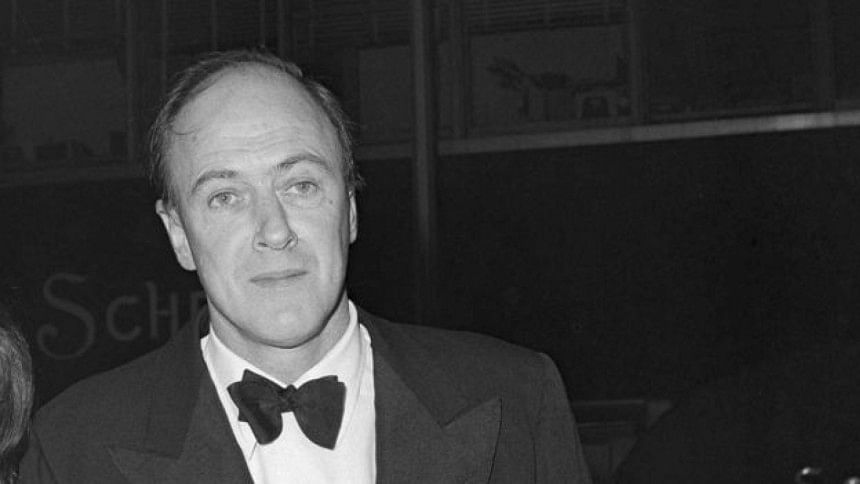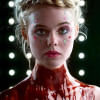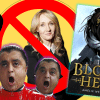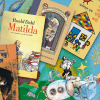Roald Dahl's swashboggling words get their own dictionary

Swashboggling and frobscottle are among thousands of Roald Dahl's words to be compiled in a dictionary celebrating the centenary of the writer's birth.
Almost 8,000 real words - and invented ones - are included in the dictionary, which has taken five years to compile.
Dahl famously invented words to stop his readers getting so bored they closed their books and watched TV.
Gumplewink, grobbled and sleep squiggler were unused but found in his archive during research for the book.
With his love of wordplay, Dahl would scribble his words on yellow pages from the American legal pads he used to write in, swapping letters around and adopting spoonerisms and malapropisms.
The Oxford Roald Dahl Dictionary, which features Dahl's long-time illustrator Sir Quentin Blake, was compiled by lexicographer Dr Susan Rennie.
Some of his other words include:
Lickswishy: "A lickswishy taste or flavour is gloriously delicious"
Phizz-whizzing: "If you like something or someone"
Wondercrump: "Wonderful or splendiferous"
Snozzberry: "A type of berry you can eat"
Snozzwanger: "A deadly three-footed creature that preys on Oompa-Loompas"
Scrumdiddlyumptious: "Food that is utterly delicious"
Flushbunking: "Makes no sense whatsoever"
Gobblefunk: To "play around with [words] and invent new words or meanings"
Bopmuggered: "If a giant is bopmuggered, he is in a very bad situation"
Frobscottle: A "green fizzy drink that the BFG and other giants drink instead of water"
Swashboggling: "Very special"
Squishous: "Very easy to squish"
Dr Rennie said Dahl built his new words on familiar sounds, adding: "He didn't always explain what his words meant, but children can work them out because they often sound like a word they know, and he loved using onomatopoeia.
"For example, you know that something lickswishy and delumptious is good to eat, whereas something uckyslush or rotsome is definitely not.
"He also used sounds that children love to say, like squishous and squizzle, or fizzlecrump and fizzwiggler, which makes his stories so much fun to read, whatever age you are," she added.
And Dr Rennie told BBC Radio 4's Today programme that the vast majority are either words Dahl invented, or "existing words that he used in interesting ways in his works".
She said: "Some of them have already escaped Dahl's world, like scrumdiddlyumptious. Children use Dahl's words a lot in their own writing and also create words inspired by the way he built words.
"He sometimes pulled the syllables of words apart and rebuilt them, combined them, and we can see children doing that in their own writing."
Some of the words in the dictionary reflect exclamations or phrases that may appear somewhat arcane today, such as ruddy, blithering, breeches and lavatory, which would have been familiar to the educated middle and upper classes of the 1940s.
Dahl also slipped biographical details into his stories, such as Matilda's parrot called Chopper, which was the name of his own Jack Russell dog.
'Swashboggling'
Matilda actually means "mighty in battle" and was often used as a name for the tanks used in North Africa during World War Two, in which Dahl served as an RAF pilot.
Luke Kelly, managing director of the Roald Dahl Literary Estate, and Roald Dahl's grandson, said: "Roald Dahl's inventive, playful use of language is a key element to his writing, so it is wonderful to have this dictionary compiled with such expertise, passion, and wit.
"I hope it serves as a swashboggling source of inspiration for a whole new generation of storytellers."
Dahl's first children's story, James and the Giant Peach, was published in 1961 and was a hit. Every subsequent book became a bestseller, including Charlie and the Chocolate Factory, Fantastic Fox and the BFG.
His books are available in 58 languages and more than 200 million have sold worldwide, with many adapted for stage and screen.
His next story to hit cinemas will be Steven Spielberg's adaptation of The BFG, starring Mark Rylance, which is set for release in July.
The dictionary is published on 2 June.

 For all latest news, follow The Daily Star's Google News channel.
For all latest news, follow The Daily Star's Google News channel. 








Comments